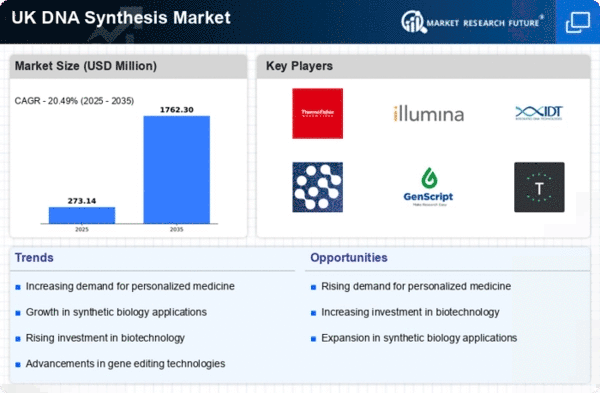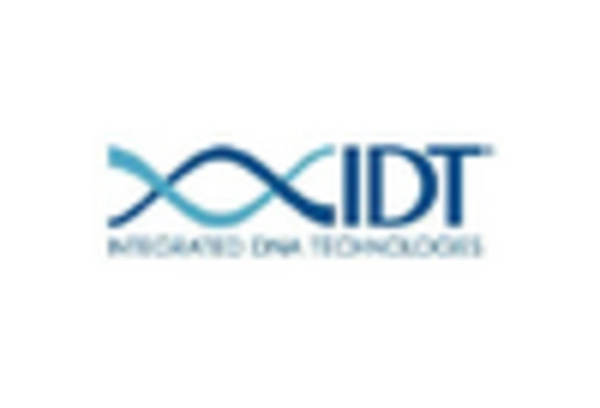Collaborative Research Initiatives
Collaborative research initiatives between universities, research institutions, and industry players are emerging as a significant driver for the DNA Synthesis Market in the UK. These partnerships facilitate knowledge exchange and resource sharing, leading to accelerated advancements in dna synthesis technologies. In 2025, it is anticipated that collaborative projects will account for approximately 30% of all research funding in the life sciences sector. Such collaborations not only enhance the capabilities of the dna synthesis market but also ensure that the latest scientific discoveries are translated into practical applications, thereby fostering growth and innovation.
Increased Focus on Genomic Research
The DNA Synthesis Market is significantly influenced by the heightened focus on genomic research in the UK. With the completion of various genome projects, researchers are now more equipped to explore genetic variations and their implications in health and disease. The UK government has committed over £1 billion to genomic research initiatives, which is expected to drive demand for synthetic DNA. As researchers require custom DNA sequences for their studies, the dna synthesis market is poised for growth. This focus on genomics not only supports academic research but also paves the way for advancements in precision medicine and diagnostics.
Rising Biopharmaceutical Investments
The DNA Synthesis Market in the UK is experiencing a surge in investments from biopharmaceutical companies. This trend is driven by the increasing need for innovative therapies and personalized medicine. In 2025, the UK biopharmaceutical sector is projected to reach a valuation of £50 billion, with a significant portion allocated to research and development. As companies seek to enhance their product pipelines, the demand for high-quality synthetic DNA is likely to rise. This investment influx not only supports the growth of the dna synthesis market but also fosters collaborations between academic institutions and industry players, further propelling advancements in synthetic biology.
Emergence of Startups and Innovation Hubs
The DNA Synthesis Market is benefiting from the emergence of numerous startups and innovation hubs across the UK. These entities are often at the forefront of developing novel technologies and applications in dna synthesis. The UK government has established various funding programs to support biotech startups, which has led to an increase in entrepreneurial activities in the sector. In 2025, it is estimated that over 200 startups focused on synthetic biology and dna synthesis will be operational in the UK. This influx of innovation is likely to enhance competition and drive advancements in the dna synthesis market, ultimately benefiting end-users.
Growing Applications in Synthetic Biology
The applications of dna synthesis are expanding rapidly within the synthetic biology domain, which is a key driver for the DNA Synthesis Market. In the UK, sectors such as agriculture, environmental science, and biofuels are increasingly utilizing synthetic DNA to create genetically modified organisms that can withstand climate change and improve crop yields. The market for synthetic biology is expected to grow at a CAGR of 25% over the next five years, indicating a robust demand for dna synthesis services. This growth is likely to encourage more companies to invest in dna synthesis technologies, thereby enhancing the overall market landscape.
















